 Petzlover
Petzlover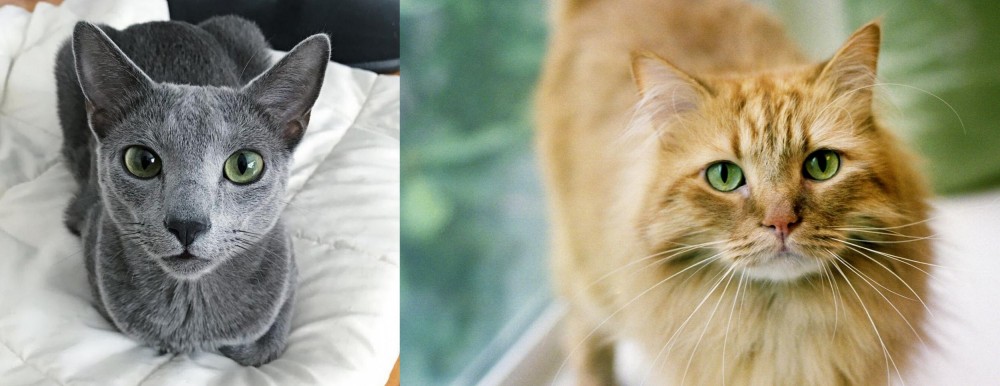 Blue Russian is originated from Russia but Ginger Tabby is originated from United States. Both Blue Russian and Ginger Tabby are of same weight. Both Blue Russian and Ginger Tabby has same life span. Both Blue Russian and Ginger Tabby has same litter size. Blue Russian requires Low Maintenance. But Ginger Tabby requires Moderate Maintenance
Blue Russian is originated from Russia but Ginger Tabby is originated from United States. Both Blue Russian and Ginger Tabby are of same weight. Both Blue Russian and Ginger Tabby has same life span. Both Blue Russian and Ginger Tabby has same litter size. Blue Russian requires Low Maintenance. But Ginger Tabby requires Moderate Maintenance
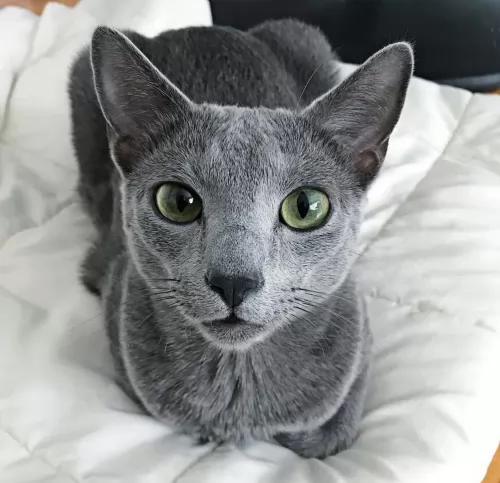 The Blue Russian is a rare cat and not much is known about its origins, but it is believed that the cat comes from northern Russia.
The Blue Russian is a rare cat and not much is known about its origins, but it is believed that the cat comes from northern Russia.
The Cat Fanciers Association believes that the cat descended from cats kept by Russian Czars. Research tells us that there is no mention of the Blue Russian until the 19th century. The Russia Blue made its first public appearance in 1875, being exhibited at London’s Crystal Palace as the ‘Archangel Cat’.
By 1912, the Russia Bue was given its own classification after its introduction to the USA in the early 1900s.
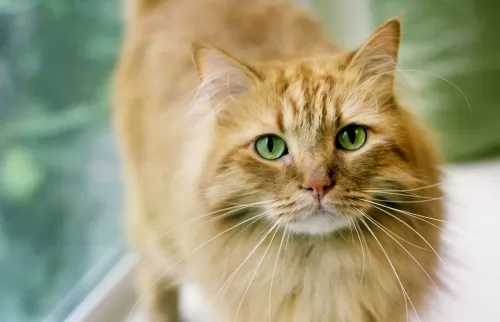 All ginger cats are tabbies – they have spots and stripes on their coat. The tabby pattern is a common wild type, and it is believed that medieval cats were tabbies.
All ginger cats are tabbies – they have spots and stripes on their coat. The tabby pattern is a common wild type, and it is believed that medieval cats were tabbies.
Most paintings and medieval manuscripts show them to be tabbies. Many people believe that these ginger cats come from a particular breed but this isn’t the case.
Ginger Cat Appreciation Day takes place in September. These cats, known as Orange Tabby Cats are very popular and they can actually have a yellow-, orange or red fur.
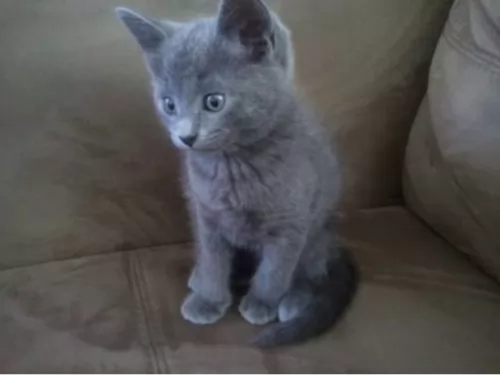 The Russian Blue is a medium-sized cat with a long, finely-boned boy. It is a slender cat, but he appears larger because of his dense double coat.
The Russian Blue is a medium-sized cat with a long, finely-boned boy. It is a slender cat, but he appears larger because of his dense double coat.
He weighs in the region of 3 – 6kg. In spite of the dense and luxurious short silvery coat, the cat doesn’t shed much. The coat can in fact be a silvery shade to a dark slate grey. The eyes are a beautiful green, the ears widely spaced and slightly rounded at the top.
The Russian Blue is a sweet-tempered cat who becomes attached to his human owner and who will even follow his owner much like a dog.
This particular cat breed may be quite shy, but he becomes social around his family members and may even be reluctant to share time with strangers.
He also doesn’t mind spending some time alone if you have to work. Curious and intelligent the Russian Blue is somewhat reserved but he makes a great companion as he is sensitive to his owner's moods.
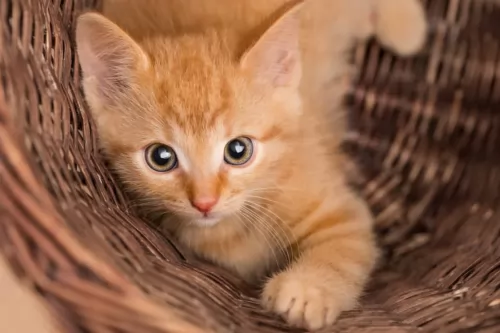 Ginger cats have different patterns to the short or long silky coats – mackerel or striped, spotted, patched, ticked, and classic.
Ginger cats have different patterns to the short or long silky coats – mackerel or striped, spotted, patched, ticked, and classic.
In fact the Ginger Tabby isn’t referring to a specific cat breed but rather a distinct color pattern. These cats get their ginger coloring from the pigment pheomelamin, the pigment red-headed humans also have.
The Ginger Tabby can range in size so generally they’re between 3 -6kg in weight. It also seems that a higher number of ginger or orange tabbies are male, put down to genetics. The eyes of the cat can be green, gold or copper.
The Ginger Tabby just loves being around his human family and to show his pleasure, you’ll hear loud purring.
They are affectionate cats and aren’t afraid to show you. These cats have a reputation for being friendly but you also have to bear in mind that a cat’s personality depends on their early socialization with people and other cats.
The Ginger Tabby is an independent, bold, courageous cat with a feisty nature.
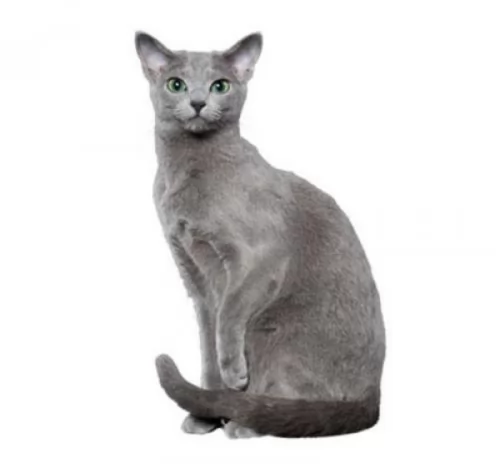 Russian blue cats are such intelligent creatures and he will require some mental stimulation because of it.
Russian blue cats are such intelligent creatures and he will require some mental stimulation because of it.
He loves mealtimes, but remember to not overfeed him as this shortens his lifespan.
He is a vocal cat and will tell you when he is hungry or he wants to play.
These cats don’t like too many changes so keep things the same for him.
When you try to keep your lovely Blue Russian happy, you’ll be rewarded by having a fantastic feline companion.
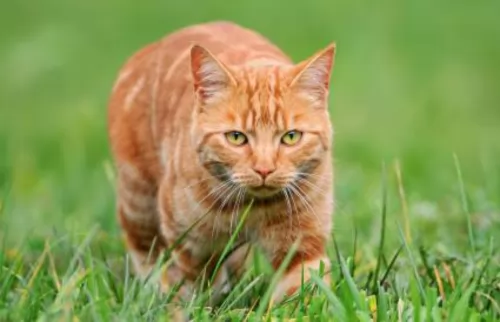 The link between personality and hair color is a talking point among humans, and so it is with cats.
The link between personality and hair color is a talking point among humans, and so it is with cats.
The Ginger Tabby, with its marmalade shade coat is feisty, playful, bold, courageous, and interesting.
Certainly, when you bring this cat into your home, not only are you going to have a beautiful cat but one that is full of character and charm.
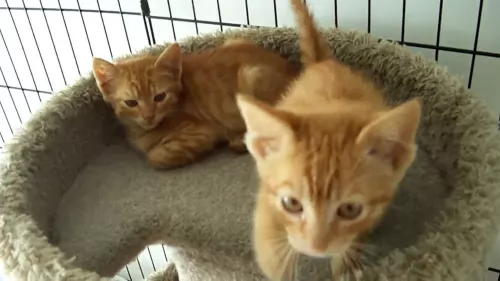 Guard your ginger tabby against eating too much and guard against a diet that is nutritionally inadequate as this contributes to poor health.
Guard your ginger tabby against eating too much and guard against a diet that is nutritionally inadequate as this contributes to poor health.
Cats are carnivores and live on meat but you can speak to your vet about giving your cat the chance of a long life by feeding him proper amounts of a healthy diet.
Make sure he also gets plenty of exercise. Offer him things to climb on, such as an indoor climbing tree so that he can exercise when you’re not there. This is important for helping him stay physically and mentally fit.
All cats are susceptible to bacterial and viral infections. Deadly diseases like this are preventable through vaccination. Vaccines offer protection from other dangerous diseases like feline leukemia virus.
All kinds of parasites – internal and external can invade your cat and make him miserable and sick and a trip to the vet is imperative.
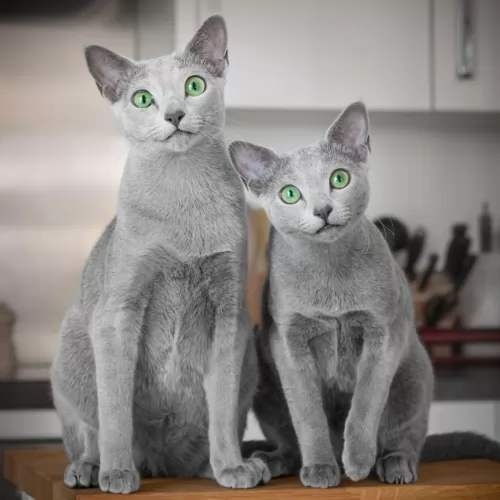 Part of caring for a cat as a responsible pet owner comes from feeding your pet. The Russian Blue is a cat that enjoys his food so you will have to look out for overfeeding.
Part of caring for a cat as a responsible pet owner comes from feeding your pet. The Russian Blue is a cat that enjoys his food so you will have to look out for overfeeding.
A cat that is overweight can start developing joint problems and diabetes. Rather stick to scheduled meals so that you can know exactly what your feline pet is getting. Such a beautiful cat needs the best food there is to keep the coat shiny and healthy and to prevent illness.
Always read the food labels to ensure the best ingredients and the right portion sizes. Make sure your cat gets food that is meat protein-rich as a cat is a carnivore.
Water is another important part of your Blue Russian’s diet. Fresh cool water should be available for your cat night and day. Water bowls are good but a water fountain is a tantalizingly attractive way for your pet to be attracted to drinking more water.
Make sure that you rake up all your cat’s droppings from the litter box every day as the Russian Blue is a hygienic cat and wants a clean litter box. Make sure the litter box is in a nice quiet spot for your cat.
The cat has a dense coat but isn’t a heavy shedder and requires very little grooming.
Ensure a decent bed for your Bombay cat. Any soft cat bedding will do, and while some cats like a simple flat mattress-type bedding arrangement, other cats like the idea of getting into a bed that provides some privacy.
You just have to find yourself a decent pet shop because when you do, you’ll find a host of soft, warm, fully washable blankets and pillows for your pet. Once you’ve decided on the right bed and a nice quiet spot, your cat will have a complex issue sorted out as some cats can be fussy with their sleeping arrangments.
Make sure your cat is neutered or spayed to avoid unwanted kittens. Neutering offers health benefits, reducing the risk of different cancers. Your cat also no longer has the desire to fight over mates and territory.
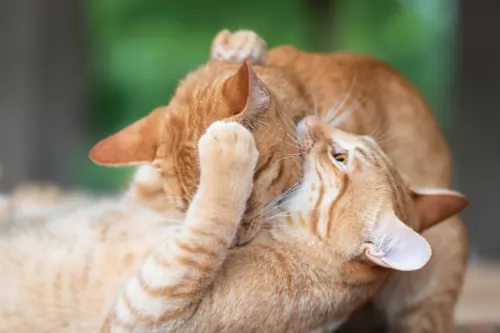 Have your Ginger Tabby cat spayed or neutered. In females, the ovaries and uterus are removed and in males the testicles are surgically removed.
Have your Ginger Tabby cat spayed or neutered. In females, the ovaries and uterus are removed and in males the testicles are surgically removed.
This common op has health benefits and decreases the likelihood of certain types of cancers in your pet. Very importantly it eliminates the possibility of your pet becoming pregnant or the male cat getting out and fathering unwanted litters. The world has too many unwanted kittens and cats as it is.
Brushing your Tabby cat will help with shedding. If you brush your Tabby once a week, you’ll remove all those loose hairs that gives your cat an ungroomed look. Cats shed more in Spring and Autumn and then you may want to increase your brushing to twice a week. Bear in mind that if your cat has shedding which is abnormal it could well be a nutritional thing. Diet is everything. He may not be getting the right mix of ingredients. Speak to your vet as your Tabby may be requiring more of certain vitamins in his diet.
Clip your cat’s nails and make a point of checking inside his mouth for bad teeth and inside his ears for wax and dirt buildup.
Your Ginger Tabby will need food and water bowls, litter box, sleeping place, collar, and toys as well as a carrier box for when he needs to get to the vet.